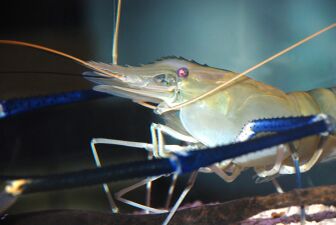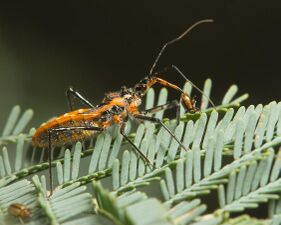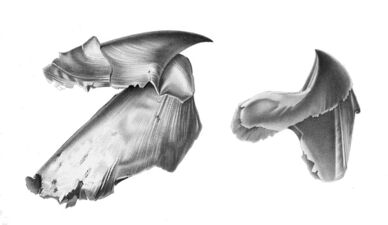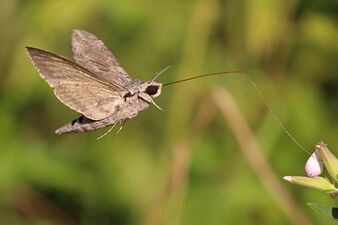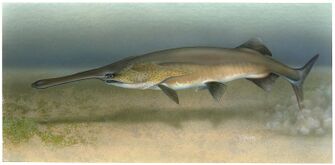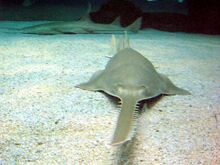Biology:Rostrum (anatomy)
From HandWiki
Short description: Anatomy term
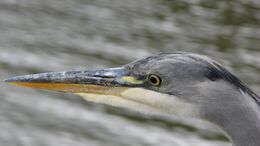
Rostrum (from Latin rostrum, meaning beak) is a term used in anatomy for a number of phylogenetically unrelated structures in different groups of animals.
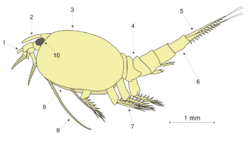
Invertebrates
- In crustaceans, the rostrum is the forward extension of the carapace in front of the eyes.[1] It is generally a rigid structure, but can be connected by a hinged joint, as seen in Leptostraca.[2]
- Among insects, the rostrum is the name for the piercing mouthparts of the order Hemiptera as well as those of the snow scorpionflies, among many others. The long snout of weevils is also called a rostrum.[3]
- Gastropod molluscs have a rostrum or proboscis.[4]
- Cephalopod molluscs have hard beak-like mouthparts referred to as the rostrum.[5]
- Invertebrate rostrums
-
Crustacean: the rostrum of the shrimp Macrobrachium rosenbergii is serrated along both edges.
-
Insect: assassin bug piercing its prey with its rostrum
-
Cephalopod: the two-part beak of a giant squid
-
Proboscis of hawk-moth (Agrius convolvuli)
Vertebrates
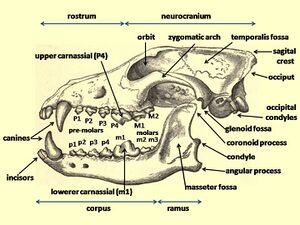
In mammals, the rostrum is that part of the cranium located in front of the zygomatic arches, where it holds the teeth, palate, and nasal cavity.[6] Additionally, the corpus callosum of the human brain has a nerve tract known as the rostrum.
The beak or snout of a vertebrate may also be referred to as the rostrum.
- Some cetaceans, including toothed whales such as dolphins[7][8] and beaked whales, have rostrums (beaks) which evolved from their jawbones. The narwhal possesses a large rostrum (tusk) which evolved from a protruding canine tooth.
- Some fish have permanently protruding rostrums which evolved from their upper jawbones. Billfish (marlin, swordfish and sailfish) use rostrums (bills) to slash and stun prey. Paddlefish, goblin sharks and hammerhead sharks have rostrums packed with electroreceptors which signal the presence of prey by detecting weak electrical fields. Sawsharks and the critically endangered sawfish have rostrums (saws) which are both electro-sensitive and used for slashing.[9] The rostrums extend ventrally in front of the fish. In the case of hammerheads the rostrum (hammer) extends both ventrally and laterally (sideways).
- The upper jawbones of some fish have evolved into rostrums
-
The paddlefish has a rostrum packed with electroreceptors
-
Sawfish have an electro-sensitive rostrum (saw) which is also used to slash at prey
See also
- Medicine:Nostril – Pair of orifices of the nose
- Biology:Snout – Extended part of an animal's mouth
References
- ↑ Charles Drew (November 17, 2003). "Crustacea". University of Bristol. http://palaeo.gly.bris.ac.uk/palaeofiles/fossilgroups/crustacea/anatomy.html.
- ↑ Todd A. Haney, Joel W. Martin & Eric W. Vetter (2007). "Leptostraca". in James T. Carlton. The Light and Smith Manual: Intertidal Invertebrates from Central California to Oregon (4th ed.). University of California Press. pp. 484–495. ISBN 978-0-520-23939-5. https://books.google.com/books?id=64jgZ1CfmB8C&pg=PA484. Retrieved 2020-09-12.
- ↑ George Gordh, Gordon Gordh & David Headrick (2003). "Rostrum". A Dictionary of Entomology. CAB International. p. 792. ISBN 978-0-85199-655-4. https://books.google.com/books?id=d0XSwMJLDg4C&pg=PA792.
- ↑ Douglas Grant Smith (2001). "Mollusca (gastropods, pelecypods)". Pennak's freshwater invertebrates of the United States: Porifera to Crustacea (4th ed.). John Wiley and Sons. pp. 327–400. ISBN 978-0-471-35837-4. https://books.google.com/books?id=GqIctb8IqPoC&pg=PA328. Retrieved 2020-09-12.
- ↑ Burt Carter. "Cephalopods". Invertebrate Paleobiology. http://itc.gsw.edu/faculty/bcarter/paleo/labs/moll/ceph.htm.
- ↑ Elbroch, Mark "Animal Skulls: A Guide to North American Species", Stackpole Books 2006, p9
- ↑ William F. Perrin; Bernd Würsig; J.G.M. Thewissen (26 February 2009). Encyclopedia of Marine Mammals. Academic Press. ISBN 978-0-08-091993-5. https://books.google.com/books?id=2rkHQpToi9sC&q=rostrum. Retrieved 12 September 2020.
- ↑ "Basic anatomy of Cetaceans - Dolphins". Robin's Island. http://www.robins-island.org/dolphins_anatomy.php.
- ↑ Wueringer, Barbara E.; Squire, Lyle; Kajiura, Stephen M.; Hart, Nathan S.; Collin, Shaun P. (2012). "The function of the sawfish's saw". Current Biology 22 (5): R150–R151. doi:10.1016/j.cub.2012.01.055. PMID 22401891.
 |
